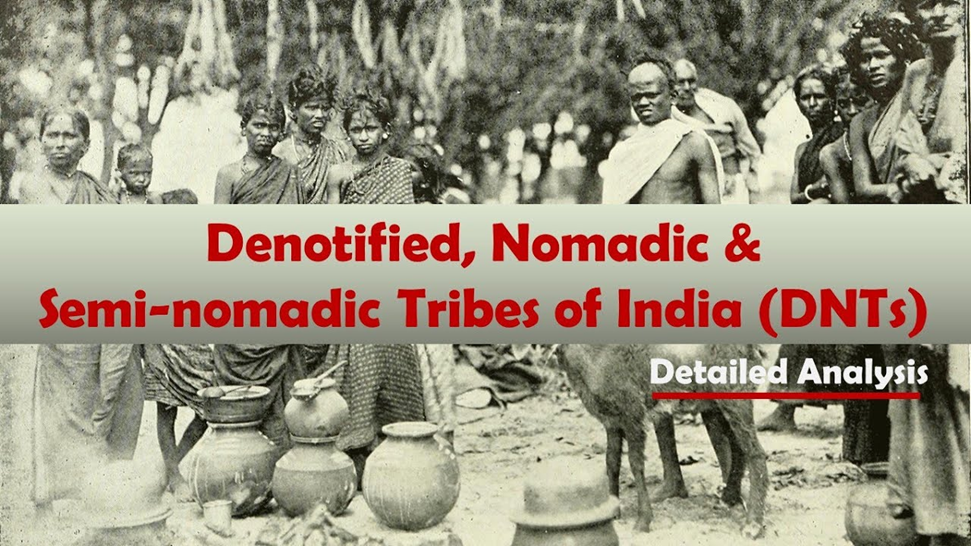Description

Copyright infringement not intended
Context: To address the challenges and aspirations of the denotified, nomadic and semi-nomadic tribes (DNTs) communities, a three-day national conclave was organized in Hyderabad from May 26 to May 28, 2023.
Details
- The conclave was attended by representatives of various DNTs from across the country, as well as activists, academics, policymakers and media persons.
- It aimed to create a platform for dialogue and exchange of ideas among the DNTs and to highlight their issues and demands to the government and the public.
Themes of discussion
- The conclave witnessed several sessions on topics such as the history and identity of the DNTs, their socio-economic and cultural rights, their access to education, health and livelihood opportunities, their political representation and participation, and their role in preserving the diversity and ecology of India.
- The speakers and panellists shared their experiences, insights and suggestions on how to improve the situation of the DNTs and ensure their dignity and inclusion in society.
'DNT Voice'
- The conclave also saw the launch of a national network of DNTs, called 'DNT Voice', which aims to be a collective voice of these communities at the national level.
- The network will work towards raising awareness about the DNTs, advocating for their rights and entitlements, and mobilizing them for collective action. It will also collaborate with other civil society organizations, media outlets and government agencies to further its objectives.
Resolution adopted
- The conclave concluded with a resolution that demanded the government to implement the recommendations of the Renke Commission (2008) and the Idate Commission (2018), which were constituted to study the problems of the DNTs and suggest measures for their welfare.
- The resolution also urged the government to enact special legislation for the protection and development of the DNTs, to grant them constitutional recognition as a separate category, to allocate adequate funds for their schemes and programs, to ensure their representation in various bodies and institutions, and to end all forms of discrimination and violence against them.
.jpeg)
Denotified, Nomadic and Semi-Nomadic Tribes (DNTs)
About
- The term 'Nomadic' and 'Semi-Nomadic' refers to those communities who practice seasonal or periodic migration as part of their livelihood strategy.
- They are engaged in various occupations such as animal husbandry, hunting, fishing, trading, performing arts, crafts, medicine etc.
- They have their own distinct culture, traditions and belief systems, which are often misunderstood or marginalized by mainstream society.
- There are no official estimates of the number of DNTs in India, but according to some sources, there are about 150 denotified tribes and 500 nomadic and semi-nomadic tribes, comprising about 10% of the total population of India.
- Maharashtra has the largest number of denotified and nomadic tribes in India.
History of DNTs
Before Independence
- The term 'Denotified' refers to those communities who were once notified as 'Criminal Tribes' under British colonial rule.
- The Criminal Tribes Act of 1871 was a draconian law that branded certain communities as 'habitually criminal' and subjected them to surveillance, registration, restriction and stigmatization.
- The Act was based on racial and caste prejudices and aimed to control the mobility and autonomy of these communities, which were mostly nomadic or semi-nomadic by occupation and lifestyle.
After Independence
- The Act was repealed in 1952 by the independent Indian government, and these communities were 'denotified'. However, the stigma and discrimination attached to them did not disappear overnight.
- Many of them continued to face harassment, violence and exploitation by the police and other dominant groups.
- Some of them were also included in the Scheduled Castes (SC), Scheduled Tribes (ST) or Other Backward Classes (OBC) categories, but many remained outside any constitutional protection or affirmative action.
Challenges faced by DNTs
- DNTs face multiple challenges in terms of social inclusion, economic development, education, health, identity and dignity.
Lack of recognition
- Many DNTs do not have any official identity documents such as voter ID cards, ration cards, Aadhaar cards etc., which deprives them of access to various government schemes and benefits.
- They also face difficulties in proving their citizenship and domicile status.
Lack of representation
- DNTs have very low representation in political institutions, bureaucracy, judiciary, media and civil society.
- They are often excluded from decision-making processes that affect their lives and rights.
Lack of education
- DNTs have very low literacy rates and educational attainment levels.
- They face barriers such as poverty, discrimination, language issues, lack of infrastructure and facilities, lack of teachers from their communities etc.
- Many children drop out of school due to migration or lack of interest.
Lack of health
- DNTs have poor health indicators such as high infant mortality rate, maternal mortality rate, malnutrition rate etc.
- They face problems such as lack of access to health care services, lack of awareness about health issues, lack of sanitation and hygiene etc.
- Many of them also practice traditional medicine systems which are not recognized or regulated by the government.
Lack of livelihood
- DNTs have low-income levels and high poverty rates.
- The traditional livelihoods of these tribes are threatened by various factors such as loss of natural resources, competition from modern technologies, legal restrictions or social prejudices.
- Many of them are forced to take up low-paid or hazardous occupations such as begging, rag-picking or manual scavenging.
Social Justice
- The denotified, nomadic and semi-nomadic tribes face various forms of social injustice such as violence, exploitation, abuse or human trafficking.
- They are often targeted by the police or criminal elements due to their perceived 'criminality' or vulnerability.
- They also face discrimination and exclusion from mainstream society due to their caste, class or gender.
Steps Taken by the Government
- The government has taken some steps to address the issues faced by these communities. It has constituted various commissions and committees to study their problems and suggest measures for their welfare and development.
- The Renke Commission (2008) was set up to look into the problems of these communities.
- The National Commission for Denotified, Nomadic and Semi-Nomadic Tribes (2015) was constituted under the chairmanship of Shri Bhiku Ramji Idate for the planned development of these communities.
- It has also set up a Development and Welfare Board for Denotified, Nomadic and Semi-Nomadic Communities (DWBDNCs) in 2019 with the following responsibilities:
- To formulate and implement Welfare and Development programmes, as required, for Denotified, Nomadic and Semi-Nomadic Communities.
- To identify the locations/areas where these communities are densely populated.
- To assess and identify gaps in accessing existing programmes and entitlements and to collaborate with Ministries/implementing agencies to ensure that ongoing programmes meet the special requirements of De-notified Nomadic and Semi-Nomadic Communities.
- To monitor and evaluate the progress of the schemes of the Government of India and the States/UTs regarding Denotified, Nomadic and Semi-Nomadic Communities.
- The Department of Social Justice and Empowerment is also implementing a Centrally Sponsored Scheme for the educational upliftment of DNTs namely Dr Ambedkar Pre & Post Matric Scholarship for students through Implementing Agencies (States/UTs).

The denotified, nomadic and semi-nomadic tribes need a holistic and inclusive approach to their development and empowerment. Some of the possible measures are:
Recognition
- The government should recognize these tribes as distinct social groups with their own identity, history and culture.
- The government should also collect accurate data and information on these tribes and include them in appropriate categories for reservation and welfare schemes.
Education
- The government should ensure universal access to quality education for these tribes, with special provisions for their retention, completion and transition.
- The government should also promote alternative education models that respect their mobility, diversity and livelihood.
Health
- The government should provide adequate healthcare facilities and services for these tribes, with special attention to their nutritional, reproductive and mental health needs.
- The government should also involve these tribes in health awareness and promotion activities.
Livelihood
- The government should protect and promote the traditional livelihoods of these tribes, by providing them with legal rights, financial support and skill development.
- The government should also create alternative livelihood opportunities for these tribes that are dignified, sustainable and compatible with their culture.
Social Justice
- The government should ensure the protection of human rights and dignity of these tribes, by preventing and punishing any form of violence, exploitation or discrimination against them.
- The government should also empower these tribes to participate in decision-making processes that affect their lives.
Way Forward
- To conduct a comprehensive census or survey of these communities to collect accurate data on their population, location, socio-economic status, education level, health status etc.
- To issue identity cards or certificates to these communities that would enable them to access various schemes and entitlements without any hassle.
- To provide them with adequate land rights or alternative housing facilities that would ensure their security and dignity.
- To ensure their participation in decision-making processes that affects their lives at various levels.
- To promote their traditional occupations or skills or provide them with alternative livelihood opportunities that are compatible with their culture and mobility.
- To enhance their access to quality education that is inclusive, flexible and culturally sensitive.
- To improve their access to health care services that are affordable, accessible and responsive to their needs.
- To protect their cultural heritage and diversity which is a source of pride and identity for them?
- To create awareness among the mainstream society about their history, culture and contribution to the nation.

Conclusion
- Denotified, Nomadic and Semi-Nomadic Tribes in India are an integral part of our society. They have a rich legacy of resilience, adaptation and innovation. They deserve respect, recognition and empowerment. There is a need for a holistic approach that recognizes their unique identity, culture and livelihoods. It is our collective responsibility to ensure that they enjoy a life of dignity and equality.
Must Read Articles:
Denotified, Nomadic, Semi-nomadic (SEED) Tribes: https://www.iasgyan.in/daily-current-affairs/denotified-nomadic-semi-nomadic-tribes
|
PRACTICE QUESTION
Q. Consider the following statements
1. Criminal Tribes Act, 1924 was enforced by the British Raj to notify certain communities as criminal tribes.
2. The National Commission for Scheduled Tribes was established to study the developmental aspects of denotified and nomadic or semi-nomadic tribes in India.
3. Uttar Pradesh has the largest number of denotified and nomadic tribes in India.
How many of the above statement is/are incorrect?
A) Only 1
B) Only 2
C) Only 3
D) All
Answer: D
Explanation:
Statement 1 is incorrect: The Criminal Tribes Act, of 1871 was the first act that notified certain communities as criminal tribes and subjected them to surveillance, registration and restrictions. The act was amended several times and repealed by the Independent Indian Government in 1952.
Statement 2 is incorrect: The National Commission for Denotified, Nomadic and Semi-Nomadic Tribes (NCDNSNT) is a national commission set under the Ministry of Social Justice and Empowerment, Government of India, to study various developmental aspects of denotified and nomadic or semi-nomadic tribes in India.
Statement 3 is incorrect: Maharashtra has the largest number of denotified and nomadic tribes in India. About five million people are belonging to these communities in Maharashtra.
|
https://www.thehindu.com/news/national/telangana/national-conclave-on-backward-and-nomadic-communities-concludes-in-hyderabad/article66897766.ece











